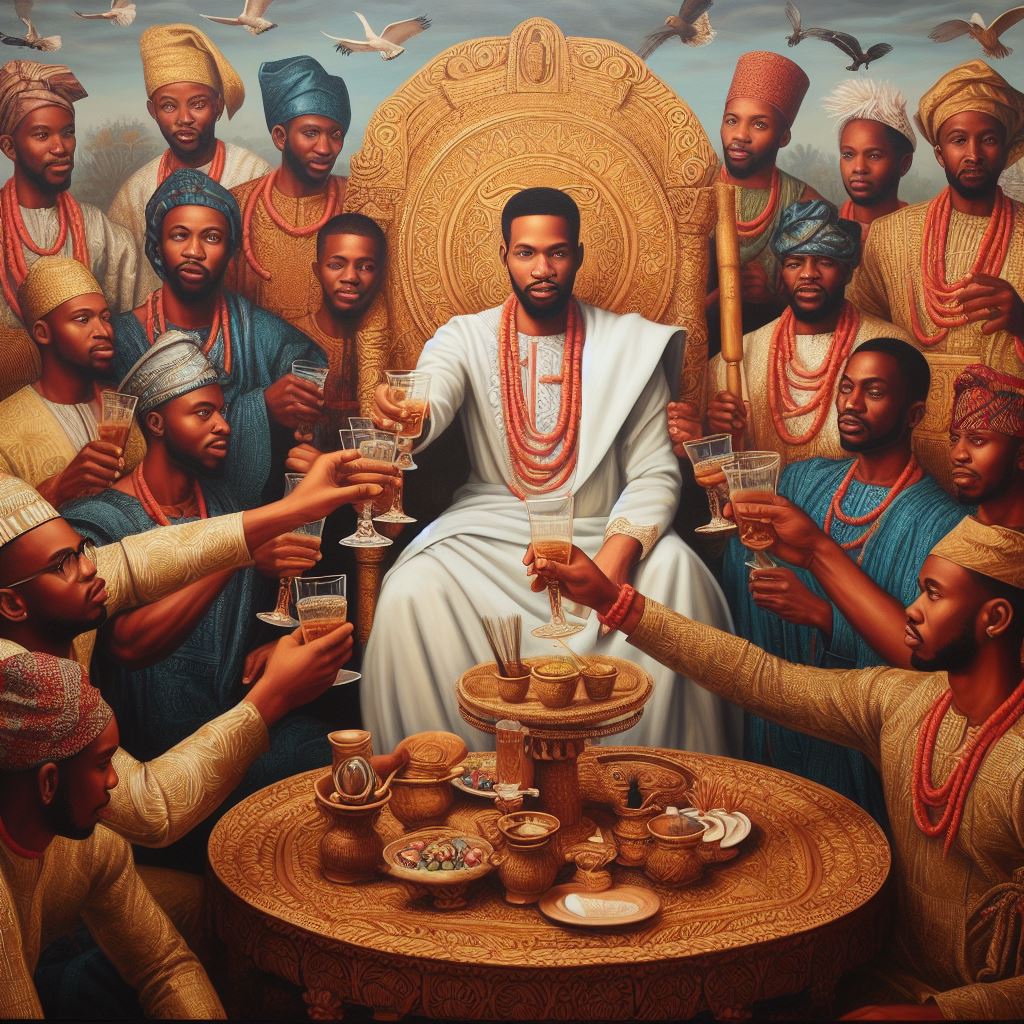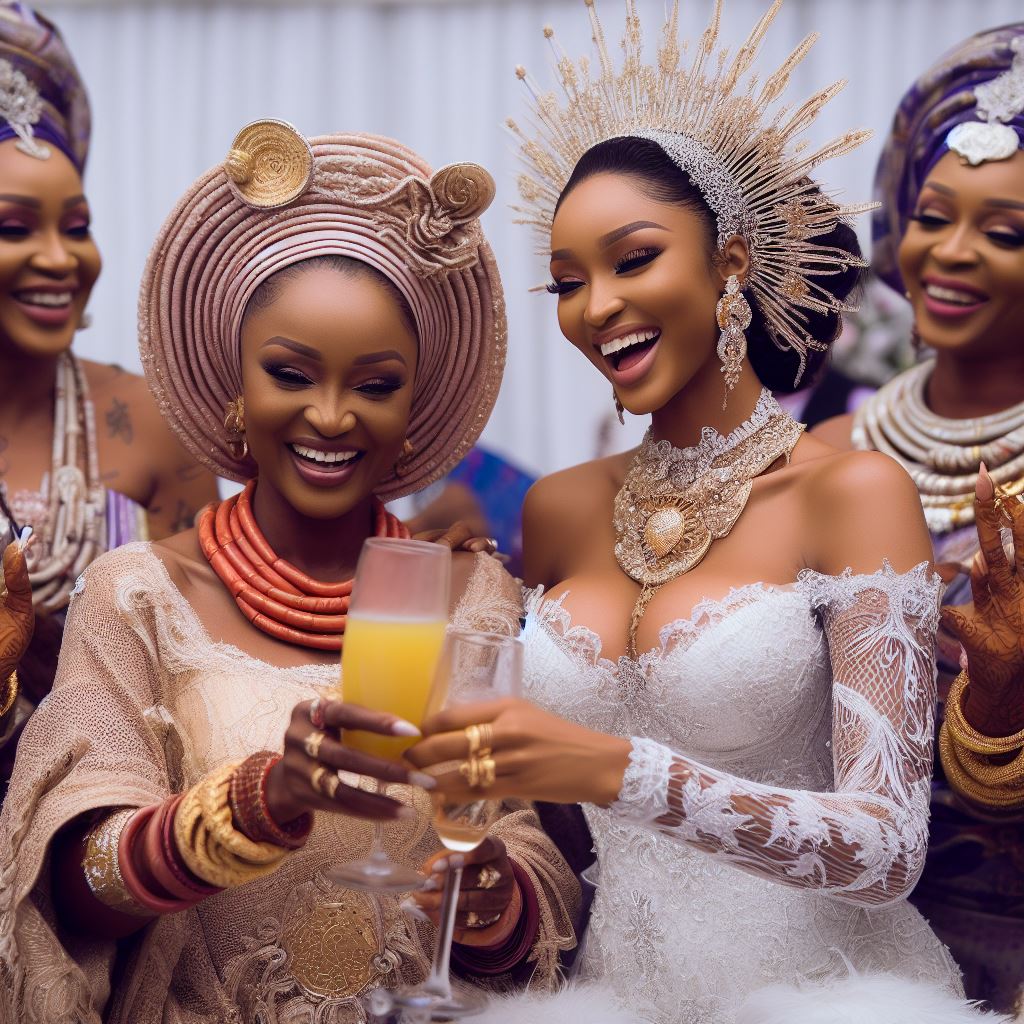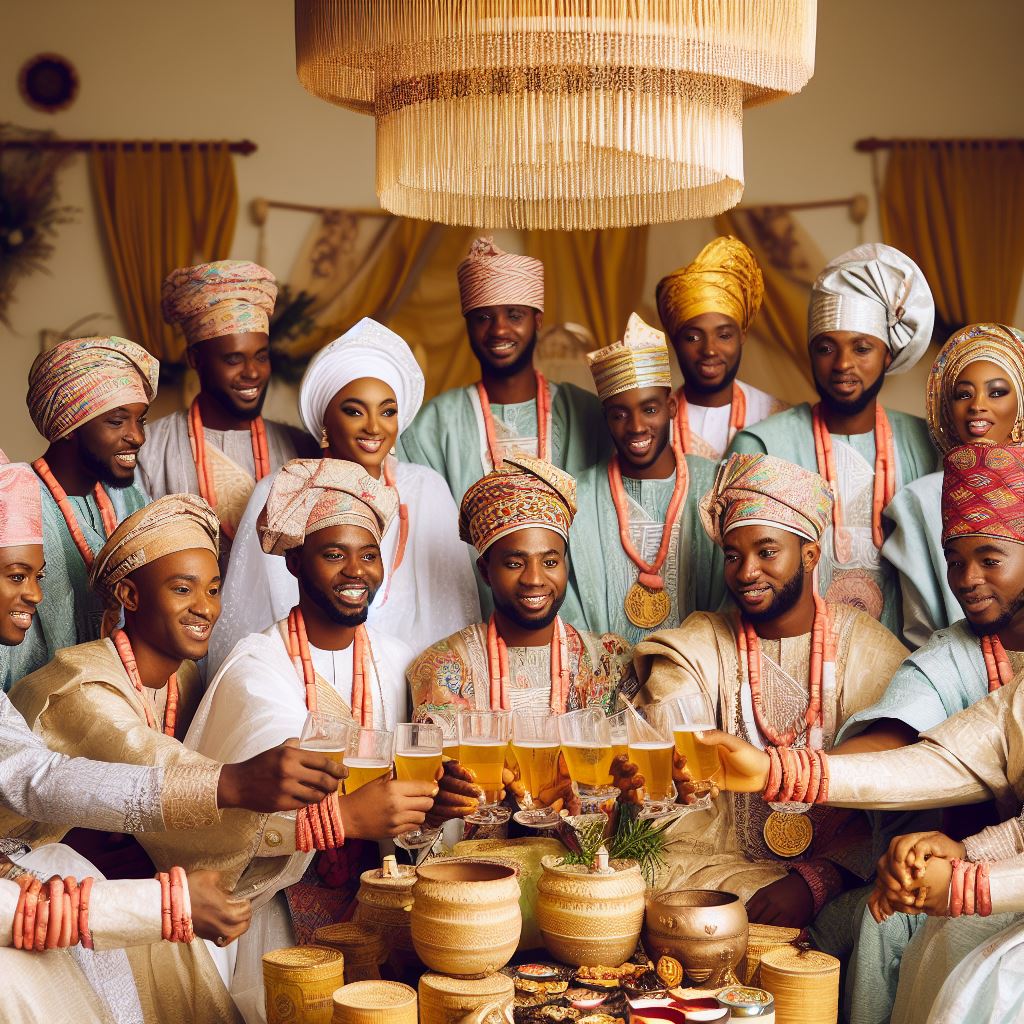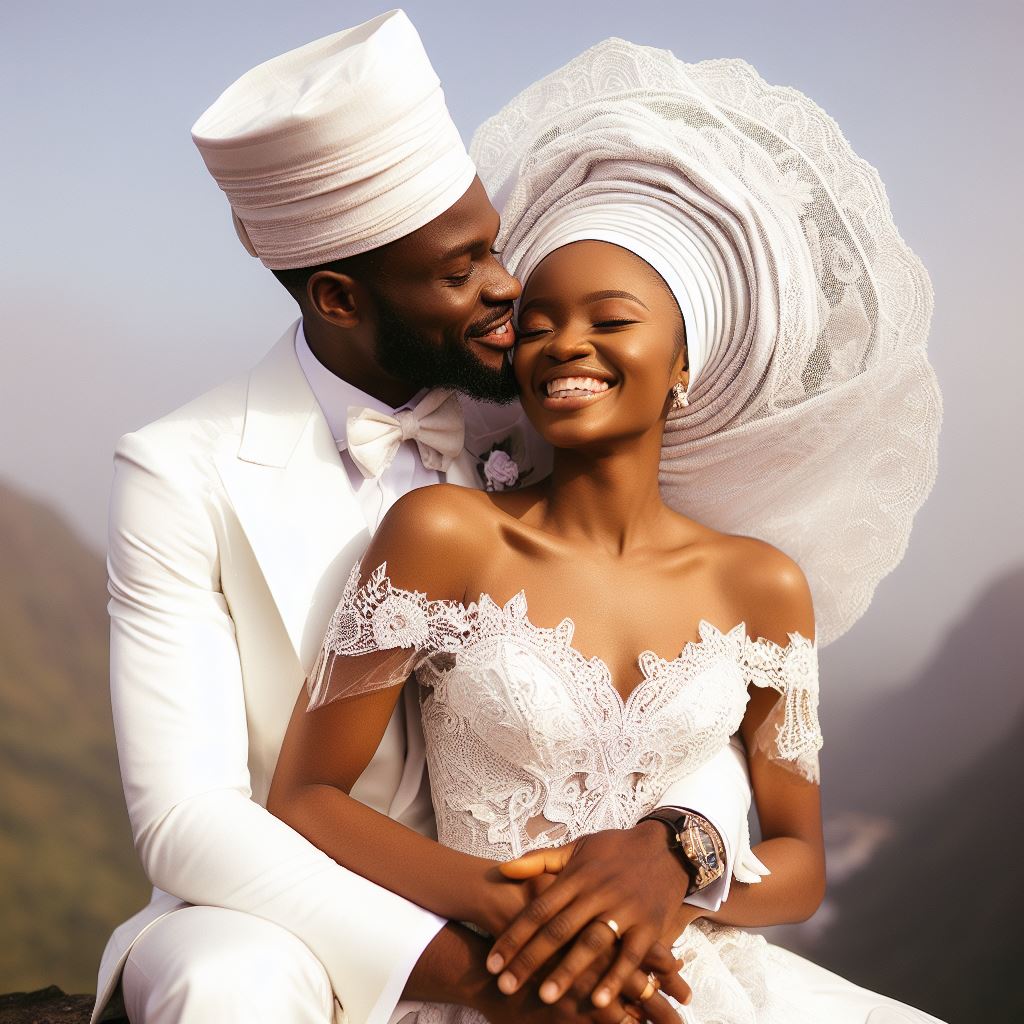Introduction
Nigerian Wedding Toast Traditions hold a significant place in Nigerian culture, symbolizing celebration and unity.
In this blog post, we will delve into the historical origins of Nigerian wedding toast traditions.
The purpose is to shed light on the rich heritage behind these customs.
Definition and importance of wedding toasts in Nigerian culture
Wedding toasts in Nigerian culture are heartfelt expressions of joy, blessing, and unity.
They symbolize the significance of community support during this life-changing event.
Toasts embody tradition, showcasing respect for ancestors and fostering family ties.
A Nigerian wedding toast typically begins with the emcee inviting esteemed guests to offer their well-wishes.
These toasts, filled with eloquence and enthusiasm, highlight the couple’s journey, character, and shared aspirations.
Through this custom, the couple is not only celebrated but also integrated into their respective families and the larger community.
Wedding toasts bridge generations and strengthen social bonds.
In Nigerian culture, toasts extend beyond mere verbal expressions.
They often involve the sharing of kola nuts, which represent hospitality and respect. This sacred ritual unifies families, instilling a sense of belonging.
Toasts also encapsulate a sense of hope, bestowing blessings upon the newlyweds, ensuring their future is as sweet as the shared drinks.
The clinking of glasses resonates with love and happiness, promising a harmonious life together.
Wedding toasts in Nigerian culture are a vibrant mosaic of tradition, unity, and celebration.
They carry the weight of history, the warmth of community, and the promise of a beautiful future, making them an integral part of any Nigerian wedding celebration.
Purpose of the blog post: exploring the historical origins of Nigerian wedding toast traditions
Nigerian wedding toasts have rich historical roots. They symbolize unity, spreading joy, and celebrating love.
These traditions date back centuries, evolving from diverse ethnic groups. Yoruba toasts often feature “Omi Osan” palm wine.
Hausa weddings celebrate with “Zobo” drink, a hibiscus-infused blend. Igbo weddings favor “Palm Wine,” a traditional favorite.
In many regions, Kola nuts play a vital role in the toasting rituals. They signify peace, respect, and hospitality.
Historically, elders led the toasts, imparting wisdom and blessings to the newlyweds. Today, family and friends participate enthusiastically.
Nigerian wedding toasts serve as a cultural bridge, connecting past and present, embracing diversity and unity.
Understanding these traditions enhances our appreciation of the vibrant tapestry of Nigerian culture, values, and love.
In the next section, we will delve deeper into the customs and nuances that make Nigerian wedding toasts so special.
Stay tuned as we unveil the secrets of these age-old traditions and their significance in contemporary Nigerian weddings.
Traditional Nigerian Wedding Customs
Traditional Nigerian wedding customs are deeply rooted in the country’s rich cultural heritage.
These customs have been passed down from generation to generation through oral storytelling and communal celebrations, making them an integral part of Nigerian wedding traditions.
Overview of traditional Nigerian wedding customs
In this section, we will provide a brief overview of the traditional Nigerian wedding customs, highlighting the significance of oral storytelling and communal celebrations.
- The Introduction Ceremony: The traditional Nigerian wedding process begins with the introduction ceremony, also known as the “knocking on the door”.
This is when the groom’s family officially informs the bride’s family of their intentions to marry. - Dowry Tradition: In Nigerian weddings, the groom is required to pay a dowry to the bride’s family as a gesture of appreciation and recognition of their daughter’s worth.
This dowry may include various items such as money, livestock, and other valuable gifts. - Traditional Attire: Nigerian weddings are known for their vibrant and elaborate traditional attire.
The bride and groom, as well as their families and wedding guests, often wear colorful traditional garments that reflect their cultural heritage. - Traditional Wedding Ceremonies: Nigerian weddings involve various traditional ceremonies, depending on the ethnic group and region.
These ceremonies include the engagement ceremony, the exchange of vows, the blessing of the union by elders, and the breaking of the kola nut, which symbolizes peace and prosperity. - Traditional Wedding Dances: Dancing is an essential part of Nigerian wedding celebrations. Different ethnic groups have their unique traditional dances, accompanied by rhythmic music and drums.
These dances bring joy and entertainment to the wedding festivities
The significance of oral storytelling and communal celebrations
- Importance of Oral Storytelling: Nigerian wedding customs are often accompanied by oral storytelling.
Elders and family members share stories about the couple’s ancestry, values, and cultural significance, passing down their heritage to the younger generation. - Communal Celebrations: Nigerian weddings are communal celebrations that bring together family, friends, and the wider community.
These celebrations foster a sense of unity, support, and collective joy, making the wedding a memorable and inclusive event. - Feasting and Cuisine: Nigerian weddings are known for their grand feasts and diverse cuisine.
Traditional dishes such as jollof rice, pounded yam, egusi soup, and suya are often served, offering a delicious culinary experience for all. - Music and Drumming: Music and drumming play a central role in Nigerian wedding celebrations.
Live bands or traditional musicians provide lively entertainment, creating a vibrant atmosphere filled with rhythmic beats and melodies. - Social Significance: Traditional Nigerian wedding customs hold great social significance as they reinforce cultural identity, promote family unity, and strengthen community bonds.
They serve as a reminder of Nigeria’s diverse heritage and customs.
In fact, traditional Nigerian wedding customs are characterized by rich cultural traditions, oral storytelling, and communal celebrations.
These customs bring people together, highlighting the importance of family, community, and cultural heritage.
By preserving and passing down these customs, Nigerians ensure the continuation of their unique traditions for future generations to embrace and cherish.
Pre-colonial Era
In this section, we will explore the wedding toast customs in Nigeria before the arrival of European colonizers.
Exploration of the Wedding Toast Customs
In the pre-colonial era, Nigerian wedding toasts were deeply influenced by rich cultural traditions.
The toasts were an important part of the wedding ceremony and were conducted with great significance.
These customs varied across different ethnic groups in Nigeria, each showcasing their unique practices and beliefs.
Role of Elders and Community Leaders
Elders and community leaders played a significant role in offering wedding toasts.
Their experience and wisdom made their toasts highly valued and respected by the couple and the community.
Through their toasts, the elders bestowed blessings, advice, and well-wishes upon the newlywed couple.
The toasts were not merely a formality, but a means to honor the importance of guidance and communal support.
Symbolism of Ancestral Blessings and Well-Wishes
Wedding toasts in pre-colonial Nigeria were imbued with symbolism, particularly related to ancestral blessings.
It was believed that the spirits of ancestors were present during the wedding ceremony.
Therefore, the toasts included prayers and invocations of blessings from these ancestral spirits.
The well-wishes expressed through the toasts aimed to ensure a prosperous and fruitful marriage.
The toasts also served as a way to connect the couple to their lineage and the broader community.
Symbolic gestures such as pouring libations or breaking kola nuts were often performed during the toasting ceremonies.
The pre-colonial era in Nigeria witnessed wedding toasts that celebrated the union of couples beneath the guidance of elders.
These toasts carried deep symbolism, expressing ancestral blessings and communal support for the married couple.
While the arrival of European colonizers brought changes to Nigerian culture, the essence of these wedding toast traditions remains a cherished part of Nigerian weddings today.
Join us in the next section as we delve into the impact of colonization on Nigerian wedding toast traditions.
Read: The Legal Implications of a Nigerian Marriage Contract
Colonial Era Influence
During the colonial era, European colonization had a significant impact on Nigerian wedding traditions.
This period saw the introduction of Western-style toasts and toasting etiquette, which were heavily influenced by the British.
Impact of European Colonization on Nigerian Wedding Traditions
The arrival of European colonizers in Nigeria brought about a transformation in various aspects of Nigerian society, including wedding ceremonies.
Colonial powers such as the British imposed their cultural practices and norms on the Nigerian population.
As a result, traditional Nigerian wedding ceremonies started incorporating elements of Western-style festivities.
European colonization played a crucial role in shaping Nigeria’s wedding traditions into what they are today.
Introduction of Western-Style Toasts and Toasting Etiquette
With the advent of European colonization, Nigerian wedding toasts began to take on a more formalized structure.
European-style toasting etiquette, which included raising glasses and making speeches, became part of the wedding celebration.
Toastmasters, who were responsible for leading the toasts, became a common feature at weddings.
The introduction of Western-style toasting added an element of elegance and sophistication to Nigerian weddings.
Influence of Christianity on the Format and Content of Wedding Toasts
Christianity played a pivotal role in the colonial era and had a profound impact on Nigerian wedding toasts.
Christian wedding ceremonies introduced religious blessings and prayers, which were incorporated into the toasting traditions.
Wedding toasts began to reflect biblical references and Christian values, highlighting the importance of love, fidelity, and unity.
Christianity also emphasized the role of the couple in their community and the importance of seeking blessings and support from family and friends.
As a result, Nigerian wedding toasts became not only a celebration of the couple’s union but also a reflection of their faith and community.
In essence, the colonial era significantly influenced Nigerian wedding toast traditions.
European colonization introduced Western-style toasting etiquette and formalized the structure of wedding toasts.
Today, Nigerian wedding toasts reflect a blend of traditional, Western, and Christian influences, making them a unique and integral part of Nigerian wedding ceremonies.
Read: The History of Marriage Documentation in Nigeria Explored

Post-Independence Era
- Evolution and adaptation of Nigerian wedding toast traditions after independence.
- Incorporation of modern elements, such as humorous toasts and personal anecdotes.
- Influence of globalization and westernization on wedding toast practices.
Evolution and adaptation of Nigerian wedding toast traditions after independence.
The post-independence era marked a significant shift in Nigerian wedding toast traditions.
With the nation gaining independence in 1960, cultural practices, including wedding toasts, began to evolve and adapt to the changing times.
Incorporation of modern elements, such as humorous toasts and personal anecdotes
One of the noticeable changes was the incorporation of modern elements into wedding toasts.
Traditional toasts, which were often solemn and serious, started to make room for more light-hearted and humorous toasts.
This shift reflected a desire to inject joy and laughter into wedding celebrations, making the toasts a moment of entertainment for the guests.
In addition to humor, personal anecdotes also became popular during wedding toasts in Nigeria.
People began sharing stories about the couple, highlighting their love story, achievements, or funny incidents.
These personal anecdotes gave the toasts a sentimental touch, creating a deeper emotional connection between the guests and the couple.
Influence of globalization and westernization on wedding toast practices
The influence of globalization and westernization also had a significant impact on Nigerian wedding toast practices.
As Nigeria became more connected to the rest of the world, ideas and trends from different cultures started to seep into wedding ceremonies.
Western-style toasts, where the person raising the toast expresses their well wishes to the couple, became more common.
Furthermore, the global trend of incorporating toasting into wedding speeches was also adopted in Nigeria.
This involved multiple people raising individual toasts throughout the reception, adding to the festive and celebratory atmosphere of the event.
The presence of international guests and the desire to align with global wedding customs further fueled these changes.
While the traditional aspects of Nigerian wedding toast traditions remained, the post-independence era witnessed a fusion of traditional and modern elements.
Couples and their families began to explore creative ways to combine the old and the new, giving birth to a unique blend of cultural practices that incorporated both solemnity and lightheartedness.
The evolution and adaptation of Nigerian wedding toast traditions in the post-independence era reflect the country’s dynamic and changing social landscape.
As Nigeria embraces globalization and its rich cultural heritage, wedding toasts continue to evolve, adding new dimensions to the overall wedding experience.
Read: How Marriage Contracts Differ from Traditional Vows
Regional Variations
When it comes to Nigerian wedding toast traditions, the diverse cultures of the country bring forth their unique customs and rituals, making the celebration even more vibrant and meaningful.
Yoruba Culture
In Yoruba weddings, the parents of the couple are highly respected and honored.
During the toast, the bride’s father typically offers a heartfelt speech, expressing his joy and blessings.
Guests respond with loud cheers and congratulate the couple by clinking their glasses together.
In some cases, a special family representative may be chosen to deliver the toast on behalf of the family.
Igbo Culture
Igbo wedding toasts are characterized by a rich display of cultural traditions.
Family members and close relatives take turns to raise their glasses and offer blessings and prayers.
They often include proverbs and wise sayings, emphasizing the importance of marriage and family.
Igbo toasts are often accompanied by traditional music and dance performances, creating a joyous atmosphere.
Hausa Culture
Hausa wedding toasts reflect the Islamic influence on the culture.
The focus is on prayers, seeking the blessings of Allah for the couple’s union.
Religious leaders or respected members of the community lead the toasting ceremony.
They recite Quranic verses and offer supplications for a prosperous and harmonious marriage.
Edo Culture
In Edo weddings, toasts are an essential part of the festivities.
The groom’s family members take center stage in offering toasts and blessings.
They express gratitude to the bride’s family for giving their daughter’s hand in marriage.
Prayers for love, unity, and fertility are also common during Edo wedding toasts.
Ibibio Culture
Ibibio wedding toasts are filled with symbolism and traditional rituals.
Guests raise their glasses and pour a few drops of palm wine onto the ground to honor ancestors.
They also make wishes for fertility, happiness, and prosperity for the newlyweds.
The pouring of palm wine symbolizes the pouring of blessings and abundance into the couple’s lives.
These are just a few examples of the diverse wedding toast traditions across Nigeria. Each culture brings its unique touch, reflecting their values, beliefs, and history.
Regardless of the region, toasting is seen as an integral part of Nigerian weddings, promoting unity, love, and celebration.
So, the next time you attend a Nigerian wedding, pay attention to the toasts, and you’ll witness the beauty and richness of Nigerian culture.
Read: The Role of Witnesses in Completing Nigerian Marriage Forms
Delve into the Subject: Tips for a Smooth Marriage Registration Process in Nigeria
See Related Content: Fostering Love & Mercy: The Essence of Marriage in Islam
Preservation and Revival
- Efforts to preserve and revive traditional Nigerian wedding toast traditions have been ongoing.
- Various organizations and individuals recognize the importance of these customs and are taking action.
- Nigerian cultural preservation societies actively work to document and promote these traditional toasts.
- Through research and interviews with elders, they collect and compile information about the historical significance of wedding toasts.
- These efforts aim to ensure that these customs are not forgotten or lost over time.
- Modern Nigerian couples are increasingly incorporating traditional wedding toasts into their ceremonies.
- They understand the importance of honoring their cultural heritage and want to pass it on to future generations.
- Toastmasters at Nigerian weddings are becoming more skilled in delivering traditional wedding toasts.
- They receive training and guidance to maintain the authenticity and essential elements of these customs.
- The revival of traditional toasts helps to create a sense of cultural identity and pride.
- It allows Nigerians, both at home and in diaspora, to celebrate their heritage in a meaningful way.
Promotion of cultural heritage through traditional toasts at modern weddings
- Cultural festivals and events also play a crucial role in reviving Nigerian wedding toast traditions.
- These gatherings provide platforms for showcasing these customs to a wider audience.
- Participants actively engage in reenactments of historical toasts, keeping the traditions alive.
- Traditional Nigerian musicians and poets contribute to the revival through their performances at weddings.
- Their songs and recitations incorporate the themes and motifs of wedding toasts.
- Social media platforms have further aided the preservation and revival of these traditions.
- Nigerian couples share videos and photos of their wedding toasts, inspiring others to follow suit.
- Online communities dedicated to Nigerian cultural preservation provide resources and information about traditional toasts.
- The continued popularity of Nigerian movies and music globally has also brought attention to these customs.
- Filmmakers and musicians often include scenes or lyrics that highlight the significance of wedding toasts.
- These cultural expressions serve as reminders and catalysts for the preservation and revival of these traditions.
- Academic institutions have played a vital role in studying and promoting traditional Nigerian wedding toasts.
- Researchers document the historical origins and societal importance of these customs.- They publish their findings, contributing to a broader understanding and appreciation of Nigerian cultural heritage.
- The Nigerian government recognizes the value of preserving cultural traditions, including wedding toasts.
- It supports initiatives aimed at reviving and promoting these customs at national and international levels.
- By investing in cultural preservation, the government seeks to foster national unity and identity.
- The efforts made to preserve and revive traditional Nigerian wedding toast traditions are crucial.
- An understanding and celebration of cultural heritage enrich the lives of Nigerians and promote diversity.
- By passing down these traditions, future generations can connect with their roots and preserve their cultural legacy.
Conclusion
The historical origins of Nigerian wedding toast traditions can be traced back to ancient cultural practices.
These traditions hold significant cultural value and play a vital role in Nigerian weddings.
They provide a sense of identity, unity, and pride for the couple and their families.
It is important for modern Nigerians to embrace and celebrate these traditions, as they are a reflection of their rich heritage.
Nigeria boasts a rich tapestry of cultures and traditions. Among these, the wedding toast stands out.
Unlike Western traditions, Nigerian toasts prioritize community. In ancient times, village elders initiated these toasts. They blessed the union and asked ancestors for approval.
Palm wine played a pivotal role in toasting. This indigenous drink symbolized purity and life’s sweetness. The eldest would take the first sip, signifying respect to age and wisdom.
Then, the couple followed, representing their united future. Sharing the wine indicated mutual respect and trust.
Over time, colonization introduced Western influences. While champagne sometimes replaced palm wine, the essence remained unchanged.
Today’s toasts blend both traditional and modern elements. Families still emphasize blessings, unity, and a prosperous future.
Guests actively participate, showing their support. Singing and dancing often accompany the toast, making it lively and memorable.
The collective celebration ensures lasting memories.
Nigerian wedding toasts mirror the nation’s journey. They combine deep-rooted traditions with contemporary influences.
As couples raise their glasses, they embrace a history of unity, community, and love.
By incorporating these customs into contemporary weddings, couples can honor their ancestors and create lasting memories.
Overall, Nigerian wedding toast traditions are not just about raising a glass, but about connecting with history and preserving cultural heritage.
So let us raise our glasses and toast to love, unity, and the beauty of Nigerian traditions in weddings!




